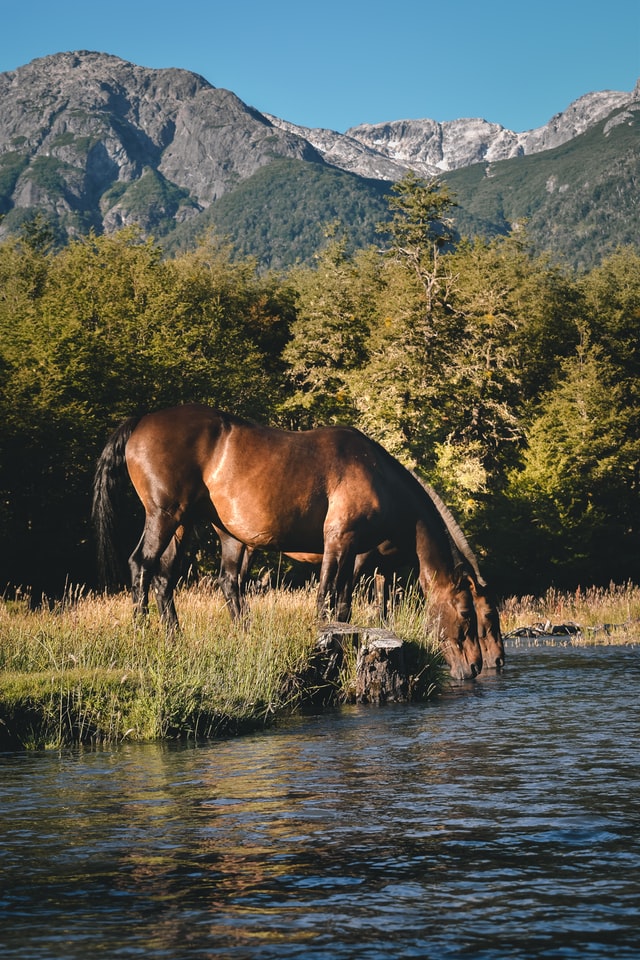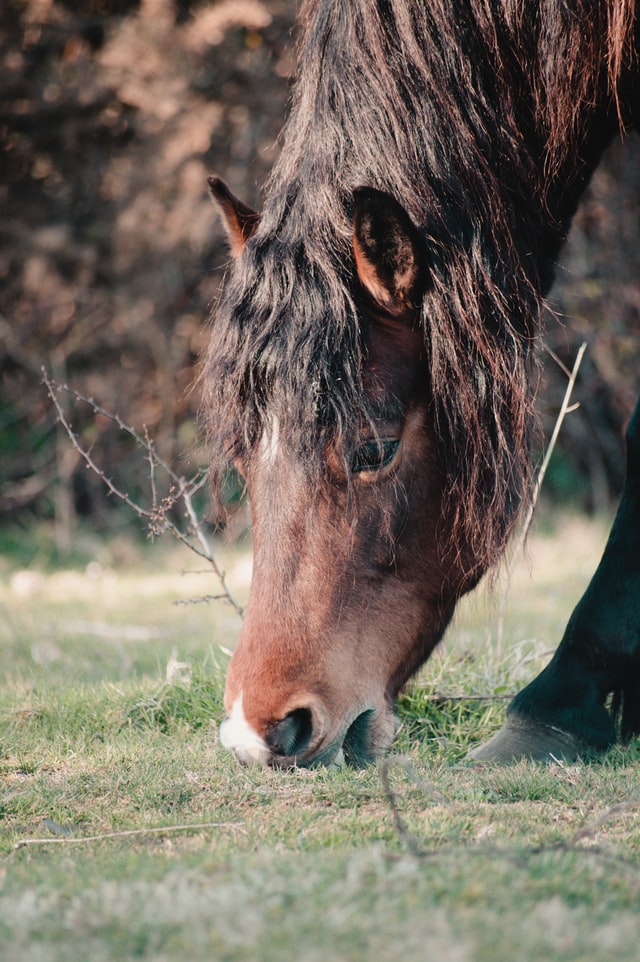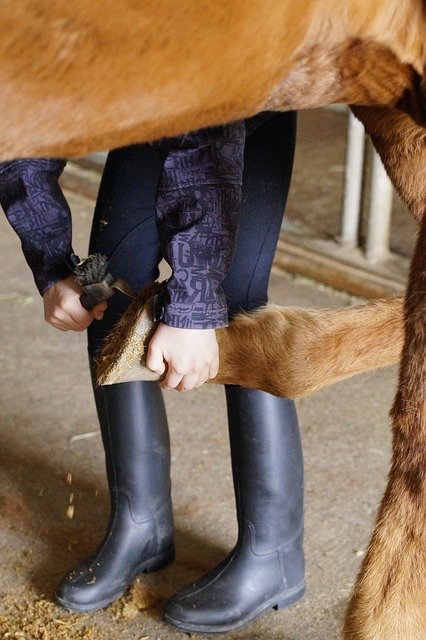Horse Lying Down – Is It Normal?
You may see a horse lying down in a field or stall and worry about it.
In this post we’ll go over all the reasons for a horse lying down and when you should worry.

We all know the importance of sleep.
We also know that good sleep can have a total sleep time of at least 8 hours.
But, this isn’t the story for horses.
Proper sleep for a horse doesn’t necessarily need a comfortable bed.
Horses can sleep standing up.
For more posts on horse health care
Horse Lying Down – Why It’s Necessary
A horse sleeps standing up and lying down.
A common mistake lots of people make is the thought of horses not being able to sleep much because of the short period they spend lying down.
We humans like to rest in a solid block of time.
However, horses are polyphasic sleepers which means they can have more than one period of sleep throughout the day.
Horses grew on open plains.
Being a prey species meant they needed to be able to notice swiftly when a predator was around.
This was the main reason horses sleep standing up.
The early horses were the ones to most likely survive.
The idea of sleeping in a standing position might be weird for us.
But, horses are built by design to be able to.
They have this passive stay apparatus in their hind limbs that allow them to stand sleeping.
It is a special arrangement of muscles and the parts connecting the muscles to the bones.
This allows a horse to have a standing rest.
When an animal’s muscles start to relax, the stay apparatus in the front legs automatically starts.
The bottom half of the stay apparatus is made up of the suspensory apparatus, which is almost the same for both front and hind legs, however, the top section of the stay apparatus differs between the front and back legs.
A healthy horse can weigh around 900 to 2000 pounds.
With this in mind, when horses sleep in an upright position, they stand on three legs and rest on the fourth one.
It rests on each leg for short periods, to give each leg a chance to rest.
Because horses can’t rest on a leg for a long time, good management of time is needed to let every leg rest.
These periods are equivalent to short naps for human beings.
We all know that it takes a great deal of rest to be able to have the energy we need for the next day, which is why having a deep sleep is an important thing.
There are different stages of sleep—both in light and deep sleep.
On the same note, when a horse lies down, it will be able to reach the deeper stages of sleep.
A Horse’s Sleep Patterns
As I mentioned earlier, as a prey animal, horses that do not learn how to sleep in an upright position might be prone to sleep deprivation.
In deeper sleep states, both horses and humans can experience slow-wave sleep (SWS) and rapid-eye movement (REM) sleep.
The period of each sleep phase is usually consistent.
REM is important, and it can only be experienced by horses when a horse lays down as its muscles fully relax.
In REM sleep (also called paradoxical sleep), there is a change that occurs in the sleep-related brain activity of a horse.
It’s when they’re fully rested that some horses can even snore!
This is because of the loss of muscle tone which leads to the narrowing of the upper airway.
The blood flow and heart rate are also affected. They both become unstable.
Within a 24-hour period, horses that only get a few minutes of REM sleep can be prone to collapse.
On the other hand, horses that get enough sleep and are able to sleep for a long period of time might collapse less.
REM sleep is very important.
If horses don’t get to rest lying down, they might fall into REM sleep while standing up.
Due to this, they are more prone to collapsing as their muscles tend to relax when achieving REM sleep.
Horse sleep is very important.
Horse owners or horse trainers should be very attentive to the rest that this prey species get.
Young horses are more likely to get more hours of sleep than adult horses do.
When To Worry
Being able to stand while sleeping is indeed an amazing ability that horses have.
But, this same ability is also one of the common reasons for horses to develop serious cases of physical problems.
One of the ways to check the physical health of a horse is through its body language.
A horse that has been sleep-deprived may collapse, stumble more, or seem more stressed and anxious.
A common ailment that can be seen in a physical exam is physical pain.
These could be abdominal pain, musculoskeletal pain, or even gastric ulcer.
When in pain, a horse tries to lie on its back most of the time.
Sometimes, being on the ground can be hard to do, too, which forces it to keep standing—which as discussed earlier, is also unwise.
A rule of thumb is to seek medical treatment, especially when dealing with old horses.
A horse laying down may also be experiencing colic.
Colic is the general term used when a horse experiences abdominal pain for unknown reasons.
There are many reasons a horse may colic including internal parasites, a twist in their intestines, eating grass or food that is too rich, dehydration and more.
Colic pain can go from being a light belly pain to being very painful that a horse just thrashes around like crazy.
When experiencing unbearable pain, a horse rolls on its back frequently.
This is just one of the signs of colic.
Other colic symptoms include pawing, lack of appetite, teeth grinding, and stretching out.
You can also notice mucus membranes of bright pink or white showing up.
It is important to spot these colic signs early on as there are cases that might need surgical intervention.
To prevent some cases of colic, such as gas and impaction colic, it would be best to check the hay used.
Sand indigestion could also cause colic.
This can be avoided by avoiding feeding horses directly from the ground.
Adding gel to a horse’s diet when experiencing colic can be suggested in order to move the sand out of the digestive tract.
Another time to worry is if it seems like the horse is lying down and his legs are unusually stiff and his eyes are rolled back in his head.
Horses can have seizures just like humans and a vet should be called right away.
Lastly, if the horse is lying down but his legs are tucked underneath him, but he seems unable to get up, this is another cause for concern.
Horses’ bodies are so heavy they can only lay in this position for the short term without causing major damage.
Your vet and the local police office need to be called.
A lot of police offices have contacts with large animal rescue groups who may have the equipment needed to push your horse upright.
Learning more about horses can help before actually taking care of them.
This way, you will be able to tell why they act the way they do and what you can do to try to make them feel better.
For more posts on horse health care, check out our posts.

Lauren is an internationally published author, trainer, and has helped hundreds of horse-rider combinations create lasting bonds and the success they desire. Check out Lauren’s incredible story: From horse-crazy girl to international equine educator. Or if you want to send Lauren a quick message, check out her contact page here.


